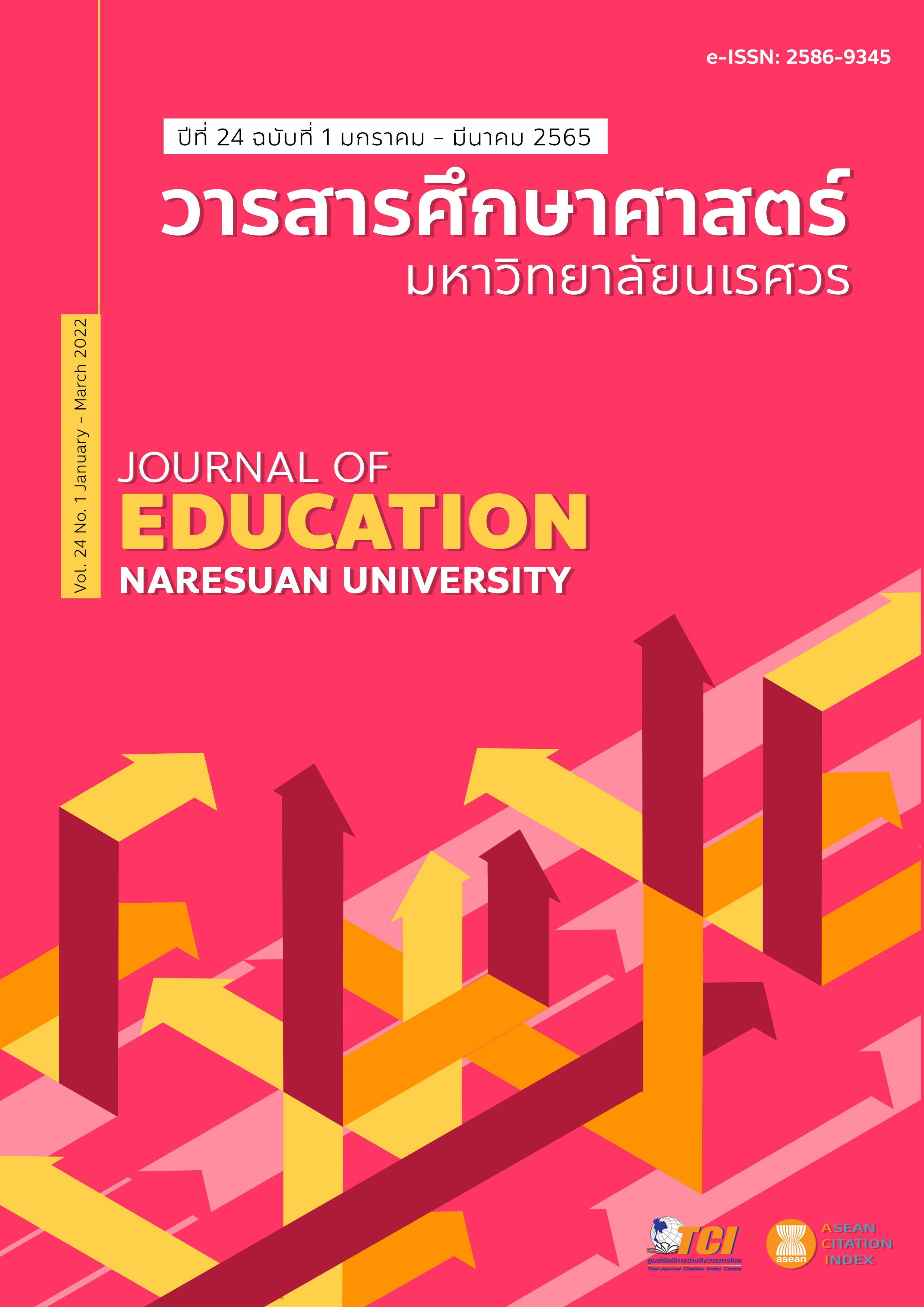DEVELOPMENT OF MEASUREMENT INSTRUMENT OF TEACHERS' RESEARCH MINDSET การพัฒนาเครื่องมือวัดกรอบคิดติดยึดด้านการวิจัยของครู
Main Article Content
Abstract
The purpose of this research is to develop the measurement instrument of teachers’ research mindset. Data were obtained from 502 teachers under Office of the Basic Education Commission and were collected by using a 5-point multidimensional-within-item rating scale. The data were then analyzed by confirmatory factor analysis. The research findings were as follows:
1. The measurement instrument of teachers’ research mindset consists of 3 components: thought towards research, feelings towards research, and research behaviors. The contents of the statements in
the measurement tool are related to classroom research according to plan, act, observe, and reflect (PAOR).
2. The measurement instrument of teachers’ research mindset has content validity as examine by experts. The Cronbach’s alpha reliability coefficients ranged between .49-.74. Is also has construct validity as shown by the model fit with the empirical data (χ2 (30, N=502) = 38.93, p = .13, CFI = .99, TLI= .99, SRMR = .02,
RMSEA = .02).
Article Details

This work is licensed under a Creative Commons Attribution-NonCommercial-NoDerivatives 4.0 International License.
The owner of the article does not copy or violate any of its copyright. If any copyright infringement occurs or prosecution, in any case, the Editorial Board is not involved in all the rights to the owner of the article to be performed.
References
Cho, E., & Kim, S. (2015). Cronbach's coefficient alpha: well known but poorly understood, Organizational Research Method, 18(2), 207-230. DOI: 10.1177/109442811455994
Cobanoglu, C., Warde, B., & Moreo, P. J. (2001). A comparison of mail, fax and web-based survey methods, International Journal of Market Research, 43(4), 405-410. DOI: 10.1177/147078530104300401
Davis, J., Clayton, C., & Broome, J. (2017). Thinking like researchers: Action research and its impact on novice teachers’ thinking. Educational Action Research, 26(1), 1-16. DOI: 10.1080/09650792.2017.1284012
Dweck, C. S., Chiu, C. Y., & Hong, Y. Y. (1995). Implicit theories and their role in judgments and reactions: A word from two perspectives. Psychological inquiry, 6(4), 267-285.
Dweck, C. S., Walton, G. M., & Cohen, G. L. (2011). Academic tenacity: Mindsets and skills that promote long-term learning. Gates Foundation. Seattle, WA: Bill & Melinda Gates Foundation.
Fishbein, M., & Ajzen, I. (1975). Belief, attitude, intention and behavior: An introduction to theory and research. Addison-Wesley, Boston.
Freeman, D. (1998). Doing teacher research: From inquiry to understanding. New York: Heinle & Heinle Publishers.
Hartig, J., & Höhler, J. (2009). Multidimensional IRT models for the assessment of competencies. Studies in Educational Evaluation, 35(3), 57-63. DOI: 10.1016/j.stueduc.2009.10.002
Kiatsornsri, K. (2011). An analysis of factors, level, and related variables of research engagement of teachers (Master thesis). Bangkok: Chulalongkorn University. [in Thai]
MacCallum, R. C., Browne, M. W., & Sugawara, H. M. (1996). Power analysis and determination of sample size for covariance structure modeling. Psychological Methods, 1, 130-149.
McEachern, K. P., & Horton, J. L. (2016). Developing a research identity: Promoting a research mindset among faculty and students. The Educational Forum, 80(4), 444-456. DOI: 10.1080/00131725.2016.1206159
Pelton, R. P. (2010). Action research for teacher candidates. Maryland: Rowman & Littlefield Publishers.
Prasertsin, U. (2012). Research and development of teachers’ research engagement using empowerment technique (Doctoral dissertation). Bangkok: Chulalongkorn University. [in Thai]
Preacher, K. J., & Coffman, D. L. (2006). Computing power and minimum sample size for RMSEA. [Computer software]. Retrieved from http://quantpsy.org
Rawanprakhon, P., & Tayraukham, S. (2017). The development of multidimensional essay test. Journal of Community Development Research (Humanities and Social Sciences), 10(4), 13-23. [in Thai]
Seider, S. N., & Lemma, P. (2004). Perceived effects of action research on teachers' professional efficacy, inquiry mindsets and the support they received while conducting projects to intervene into student learning. Educational Action Research, 12(2), 219-238.
Taraban, R., & Logue, E. (2012). Academic factors that affect undergraduate research experiences. Journal of educational psychology, 104(2), 499-514. DOI: 10.1037/a0026851
Wongwanich, S. (2016). Classroom action research (18th ed.). Bangkok: Chulalongkorn University Press. [in Thai]


